88 Hexagons Chess
This game was created unintentionally. The author wanted to create a chessboard on which it would be possible to play all major variants of hexagonal chess in his opinion: Glinski's Chess, Shafran's Chess, and McCooey's chess. This is how HCB88 (hexagonal board with 88 hexagons - the intellectual property of the author) was created. And indeed, it was possible to play all mentioned variants on that board. The only problem was that Shafran's Chess, for example, became a very different game and the same thing happened with Glinski's and McCooey's chess. So, the author had an interesting chessboard but not an original game for it. At that point, he started looking for rules for a new game based on his personal experience with other variants of hexagonal chess.
NOTE OF THE AUTHOR:
"The original name of this chess variant of mine was "88 hexagons" according to the board which is registered and protected. Unfortunately, the number 88 has a very sinister meaning for some people, which I did not want to promote under any circumstances. I found another meaning for that number, Chinese, which is far more positive. In short, the number 88 symbolizes fortune and good luck in Chinese culture. That's why I finally changed the name of this chess variant to Good Luck Chess."
Setup
The setup is similar to that of Glinski's Chess, but as a big fan of Shafran's Chess, the author wanted to allow castling. Therefore, he put the queen and bishops together in one cluster and the king at the bottom. The elongated board gives more distance between the pieces and more interesting dynamics.
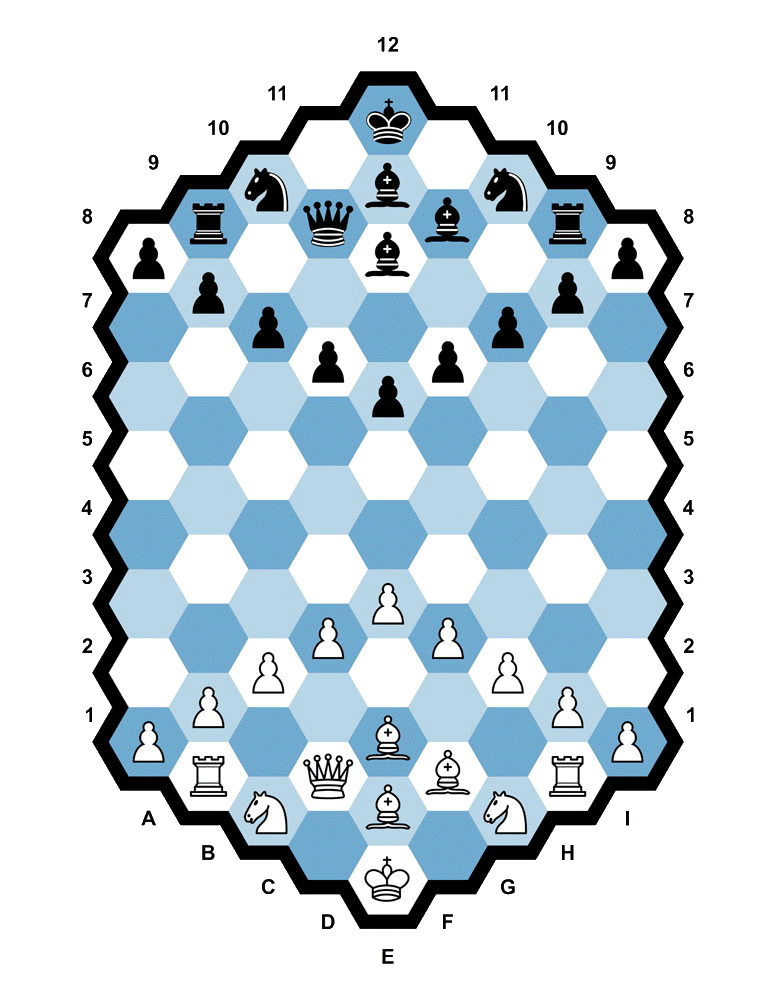
Pieces
Pawn
Pawns move forward and capture diagonally like in Shafran's and McCooey's Chess. However, from their initial position, they can move up to 3 hexagons forward if there are no obstacles. It means that they can be promoted after five moves just like in classical, standard chess but at the same time, the possible initial number of moves with pawns is much higher than in other hexagonal chess variants which also results in higher complexity of the game. In the diagram below, the possible moves for pawns are marked with green rings and the promotion cells with orange ones.
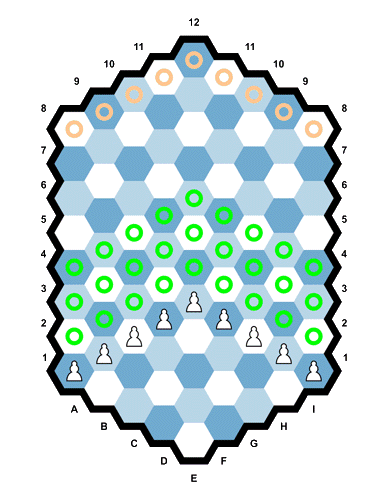
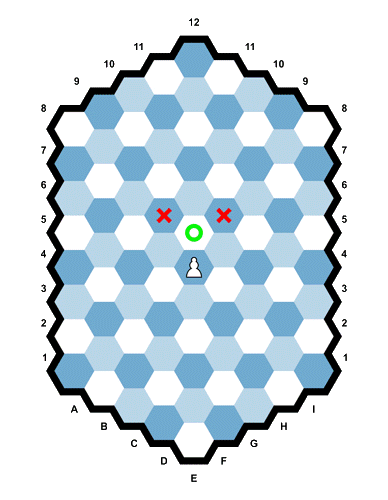
Bishop
Bishops move and capture diagonally, just like in Glinski's, Shafran's, and McCooey's chess. There are three of them on cells of three different colors.
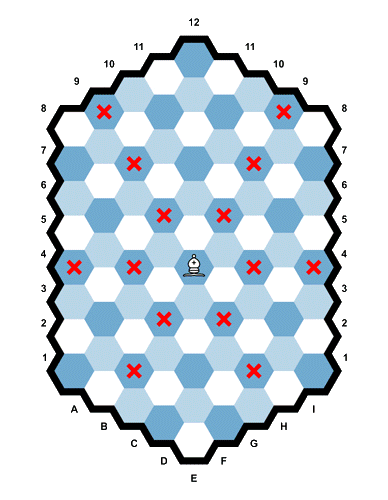
Knight
Knights move and capture just like in Glinski's, Shafran's, and McCooey's chess.
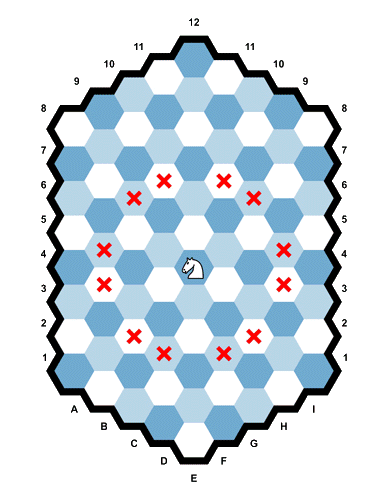
Rook
Rooks move and capture orthogonally just like in Glinski's, Shafran's, and McCooey's chess.
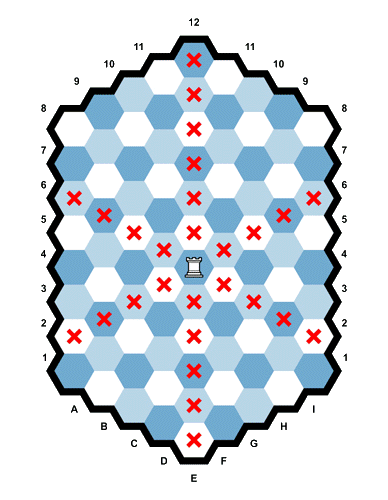
Queen
Queen moves and captures both orthogonally and diagonally just like in Glinski's, Shafran's, and McCooey's chess.

King
King moves and captures one cell orthogonally and diagonally just like in Glinski's, Shafran's, and McCooey's chess.
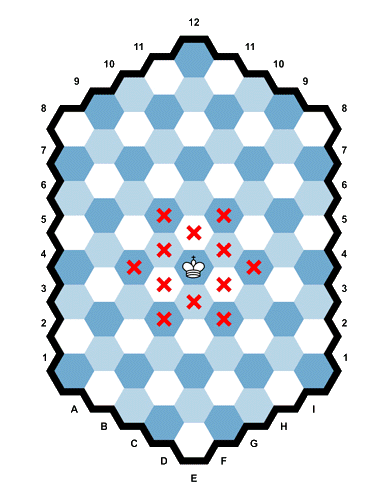
Rules
En Passant
There is the en passant capture rule like in standard chess and in Glinski's, Shafran's, and McCooey's chess.
Castling
Similar to Shafran's hexagonal chess, there is a castling rule in Good Luck Chess, which doesn't necessarily help the players but in certain circumstances can be still very useful. Castling in this variant should be much rarer than in standard chess but should happen more often than in Shafran's chess in which it is very easy to destroy an opponent's chances to use castling for defense. Castling can be played on both sides as long and short which results in higher complexity of the game.
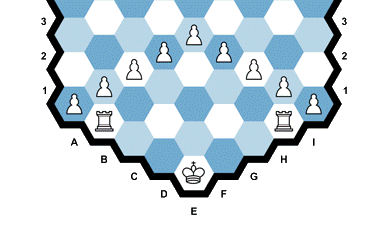
Positions of rooks and king before castling
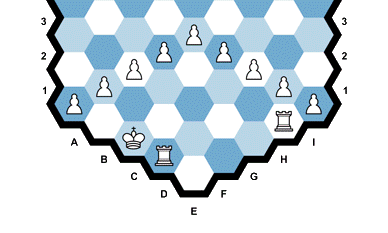
Left short castling, Notation: 0-0 (Kc1)

Right short castling, Notation: 0-0 (Kg1)
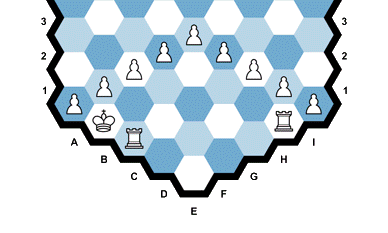
Left long castling, Notation: 0-0-0 (Kb1)
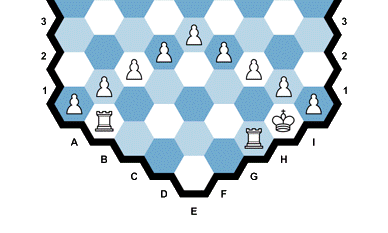
Right long castling, Notation: 0-0-0 (Kh1)
Notes
Example game
1.) Bg2 d7 2.) c5 b6 3.) b3 Bc9 4.) Qc2 Nge9 5.) Nge4 c6

position after 5 moves
6.) cxd7 Nb8
(black queen can’t take at d7 because of the counterattack with the bishop after the pawn at f4 moves forward which would result in the loss of the black rook at b9 after the black queen escapes)
7.) e6 f5 8.) Nef1 g6 9.) Bh2 Qh6 10.) Bf7 Bg10 11.) g5 Ba5+
12.) Bd2 Qh4+ 13.) Kd1 Bxf7 14.) gxf7 Ri5 15.) Qe3 Bxd2
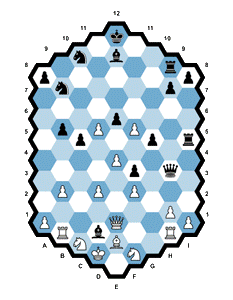
position after 15 moves
16.) Qxd2 Ba3 17.) Nf2 Bi3 18.) h3 Nd8 19.) a4 b5 20.) Qg3 Qxg3
21.) Nxg3 0-0-0 22.) Rd3 Bg7 23.) Rd2 Nf6 24.) Nxf6 Bxf6 25.) d5 cxd5
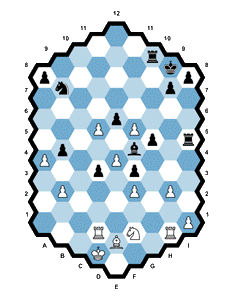
position after 25 moves
26.) Rxd5 a6 27.) d8 Rid9 28.) i4 i5 29.) Ng4 Bxg4 30.) Bxg4 Re12
31.) e7 Nc6 32.) f8 h7 33.) b4 Na3 34.) Rc5 Kg8 35.) Kd2 Kf7
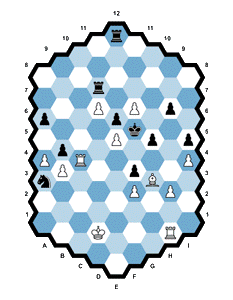
position after 35 moves
36.) Kc3 h6 37.) ixh6 Kxh6 38.) f9 Kg8 39.) Bi3 Kf10 40.) Rg2 Rh6
41.)Rc9 Ri6 42.)Bh5 Rgh 43.) d9 Rd11 44.) Re11+ Rxe11
45.) dxe11 Ke11 46.) Rd1 Rh7 47.) Bi3 Rxh3 48.) Bg7 i4 49.) Be8 i3
50.) Rd9 i2 51.) Rg10+ Kd10 52.) e12=Q+
1 – 0 Black resigned
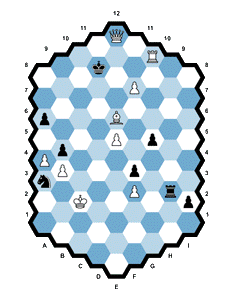
the final position
PHYSICAL APPEARANCE OF THE BOARD HCB88
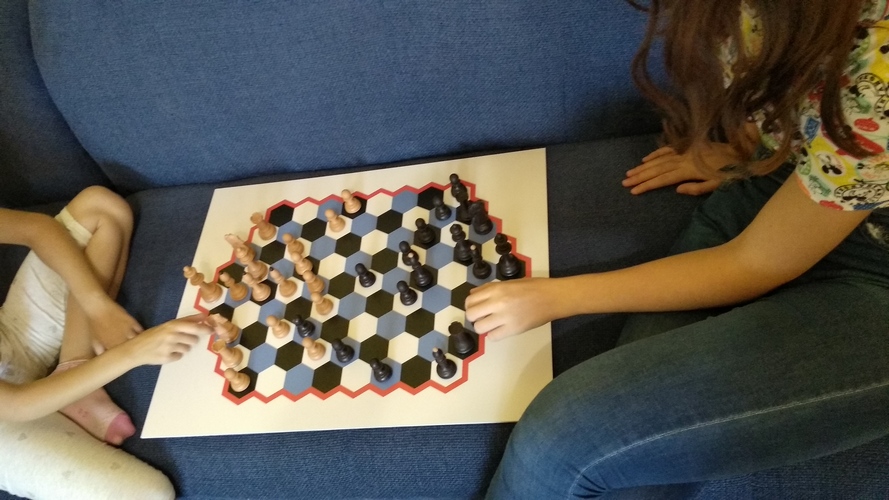
 This 'user submitted' page is a collaboration between the posting user and the Chess Variant Pages. Registered contributors to the Chess Variant Pages have the ability to post their own works, subject to review and editing by the Chess Variant Pages Editorial Staff.
This 'user submitted' page is a collaboration between the posting user and the Chess Variant Pages. Registered contributors to the Chess Variant Pages have the ability to post their own works, subject to review and editing by the Chess Variant Pages Editorial Staff.
By Davor Vujacic.
Last revised by Davor Vujacic.
Web page created: 2020-09-11. Web page last updated: 2020-09-11